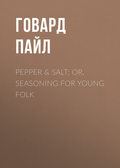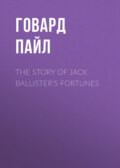
Говард Пайл
The Ruby of Kishmoor
Prologue
A very famous pirate of his day was Captain Robertson Keitt.
Before embarking upon his later career of infamy, he was, in the beginning, very well known as a reputable merchant in the island of Jamaica. Thence entering, first of all, upon the business of the African trade, he presently, by regular degrees, became a pirate, and finally ended his career as one of the most renowned freebooters of history.
The remarkable adventure through which he at once reached the pinnacle of success, and became in his profession the most famous figure of his day, was the capture of the Rajah of Kishmoor's great ship, The Sun of the East. In this vessel was the Rajah's favorite Queen, who, together with her attendants, were set upon a pilgrimage to Mecca. The court of this great Oriental potentate was, as may be readily supposed, fairly a-glitter with gold and jewels, so that, what with such personal adornments that the Queen and her attendants had fetched with them, besides an ample treasury for the expenses of the expedition, an incredible prize of gold and jewels rewarded the freebooters for their successful adventure.
Among the precious stones taken in this great purchase was the splendid ruby of Kishmoor. This, as may be known to the reader, was one of the world's greatest gems, and was unique alike both for its prodigious size and the splendor of its color. This precious jewel the Rajah of Kishmoor had, upon a certain occasion, bestowed upon his Queen, and at the time of her capture she wore it as the centre-piece of a sort of a coronet which encircled her forehead and brow.
The seizure by the pirate of so considerable a person as that of the Queen of Kishmoor, and of the enormous treasure that he found aboard her ship, would alone have been sufficient to have established his fame. But the capture of so extraordinary a prize as that of the ruby – which was, in itself, worth the value of an entire Oriental kingdom – exalted him at once to the very highest pinnacle of renown.
Having achieved the capture of this incredible prize, our captain scuttled the great ship and left her to sink with all on board. Three Lascars of the crew alone escaped to bear the news of this tremendous disaster to an astounded world.
As may readily be supposed, it was now no longer possible for Captain Keitt to hope to live in such comparative obscurity as he had before enjoyed. His was now too remarkable a figure in the eyes of the world. Several expeditions from various parts were immediately fitted out against him, and it presently became no longer compatible with his safety to remain thus clearly outlined before the eyes of the world. Accordingly, he immediately set about seeking such security as he might now hope to find, which he did the more readily since he had now, and at one cast, so entirely fulfilled his most sanguine expectations of good-fortune and of fame.
Thereafter, accordingly, the adventures of our captain became of a more apocryphal sort. It was known that he reached the West Indies in safety, for he was once seen at Port Royal and twice at Spanish Town, in the island of Jamaica. Thereafter, however, he disappeared; nor was it until several years later that the world heard anything concerning him.
One day a certain Nicholas Duckworthy, who had once been gunner aboard the pirate captain's own ship, The Good Fortune, was arrested in the town of Bristol in the very act of attempting to sell to a merchant of that place several valuable gems from a quantity which he carried with him tied up in a red bandanna handkerchief.
In the confession of which Duckworthy afterward delivered himself he declared that Captain Keitt, after his great adventure, having sailed from Africa in safety, and so reached the shores of the New World, had wrecked The Good Fortune on a coral reef off the Windward Islands; that he then immediately deserted the ship, and together with Duckworthy himself, the sailing-master (who was a Portuguese), the captain of a brig The Bloody Hand (a consort of Keitt's), and a villainous rascal named Hunt (who, occupying no precise position among the pirates, was at once the instigator of and the partaker in the greatest part of Captain Keitt's wickednesses), made his way to the nearest port of safety. These five worthies at last fetched the island of Jamaica, bringing with them all of the jewels and some of the gold that had been captured from The Sun of the East.
But, upon coming to a division of their booty, it was presently discovered that the Rajah's ruby had mysteriously disappeared from the collection of jewels to be divided. The other pirates immediately suspected their captain of having secretly purloined it, and, indeed, so certain were they of his turpitude that they immediately set about taking means to force a confession from him.
In this, however, they were so far unsuccessful that the captain, refusing to yield to their importunities, had suffered himself to die under their hands, and had so carried the secret of the hiding-place of the great ruby – if he possessed such a secret – along with him.
Duckworthy concluded his confession by declaring that in his opinion he himself, the Portuguese sailing-master, the captain of The Bloody Hand, and Hunt were the only ones of Captain Keitt's crew who were now alive; for that The Good Fortune must have broken up in a storm, which immediately followed their desertion of her; in which event the entire crew must inevitably have perished.
It may be added that Duckworthy himself was shortly hanged, so that, if his surmise was true, there was now only three left alive of all that wicked crew that had successfully carried to its completion the greatest adventure which any pirate in the world had ever, perhaps, embarked upon.
I. Jonathan Rugg
You may never know what romantic aspirations may lie hidden beneath the most sedate and sober demeanor.
To have observed Jonathan Rugg, who was a tall, lean, loose-jointed young Quaker of a somewhat forbidding aspect, with straight, dark hair and a bony, overhanging forehead set into a frown, a pair of small, deep-set eyes, and a square jaw, no one would for a moment have suspected that he concealed beneath so serious an exterior any appetite for romantic adventure.
Nevertheless, finding himself suddenly transported, as it were, from the quiet of so sober a town as that of Philadelphia to the tropical enchantment of Kingston, in the island of Jamaica, the night brilliant with a full moon that swung in an opal sky, the warm and luminous darkness replete with the mysteries of a tropical night, and burdened with the odors of a land breeze, he suddenly discovered himself to be overtaken with so vehement a desire for some unwonted excitement that, had the opportunity presented itself, he felt himself ready to embrace any adventure with the utmost eagerness, no matter whither it would have conducted him.
At home (where he was a clerk in the counting-house of a leading merchant, by name Jeremiah Doolittle), should such idle fancies have come to him, he would have looked upon himself as little better than a fool, but now that he found himself for the first time in a foreign country, surrounded by such strange and unusual sights and sounds, all conducive to extravagant imaginations, the wish for some extraordinary and altogether unusual experience took possession of him with a singular vehemence to which he had heretofore been altogether a stranger.
In the street where he stood, which was of a shining whiteness and which reflected the effulgence of the moonlight with an incredible distinction, he observed, stretching before him, long lines of white garden walls, overtopped by a prodigious luxuriance of tropical foliage.
In these gardens, and set close to the street, stood several pretentious villas and mansions, the slatted blinds and curtains of the windows of which were raised to admit of the freer entrance of the cool and balmy air of the night. From within there issued forth bright lights, together with the exhilarating sound of merry voices laughing and talking, or perhaps a song accompanied by the tinkling music of a spinet or of a guitar. An occasional group of figures, clad in light and summer-like garments, and adorned with gay and startling colors, passed him through the moonlight; so that what with the brightness and warmth of the night, together with all these unusual sights and sounds, it appeared to Jonathan Rugg that he was rather the inhabitant of some extraordinary land of enchantment and unreality than a dweller upon that sober and solid world in which he had heretofore passed his entire existence.
Before continuing this narrative the reader may here be informed that our hero had come into this enchanted world as the supercargo of the ship SUSANNA HAYES, of Philadelphia; that he had for several years proved himself so honest and industrious a servant to the merchant house of the worthy Jeremiah Doolittle that that benevolent man had given to his well-deserving clerk this opportunity at once of gratifying an inclination for foreign travel and of filling a position of trust that should redound to his individual profit. The SUSANNA HAYES had entered Kingston Harbor that afternoon, and this was Jonathan's first night spent in those tropical latitudes, whither his fancy and his imagination had so often carried him while he stood over the desk filing the accounts of invoices from foreign parts.
It might be finally added that, had he at all conceived how soon and to what a degree his sudden inclination for adventure was to be gratified, his romantic aspirations might have been somewhat dashed at the prospect that lay before him.






